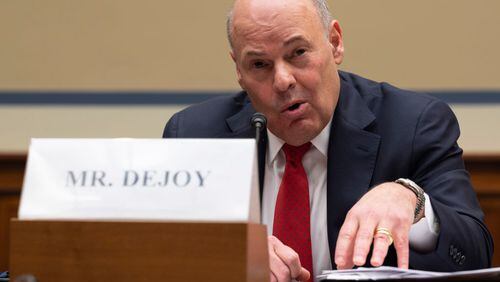The SEC presidential primary is in danger of losing its grip on an early, and often influential, stage in the next race for the White House.
Running at the SEC’s side in the race could be California.
If so, that could be bogus and heinous for Georgia and its Southern neighbors who — seeking to increase their clout — joined together in 2016 to hold their primaries on the first Tuesday in March.
Some lawmakers in California — for fun, let’s call them Bill and Ted — think that idea was most excellent. So much so, they want to make it their own. They are pushing to move up their state’s presidential primary in 2020 from June 3 — at the very back of the line — to that first contest in March.
That "would move a significant chunk of delegates from late in the calendar to the earliest spot on the calendar after the four carve-out states (Iowa, New Hampshire, South Carolina and Nevada)," political scientist Josh Putnam wrote on the FrontloadingHQ blog.
If that happens, Georgia and its Southern cousins could find themselves in a gnarly position, with candidates shunning them for a shot at California’s delegate gold.
Brian Kemp, Georgia’s secretary of state and a big force behind the SEC primary, has been watching closely.
David Dove, Kemp’s chief of staff, said one option is to shift the SEC primary to a later date. Depending on the timing, that could make it the knockout blow, handing a candidate his or her party’s nomination.
Or it could be too late and thus irrelevant.
Most nontriumphant, dude.
- Irma relief: Republican members of the state's congressional delegation are urging the commissioner of the Internal Revenue Service, John Koskinen, to extend the deadlines for federal tax returns and payments for Georgia victims of Hurricane Irma.
“While the full impact of the storm has not been fully realized, the magnitude of flood and wind damage as well as continued power and sewer outages merits immediate relief for the victims of this storm,” the group wrote in a letter to Koskinen.
- Franklin gets frank about Reed: Shirley Franklin thinks Kasim Reed, who succeeded her as Atlanta's mayor, needs a history lesson about his predecessors in the office.
“As I follow local politics now, I am amazed by the complete and utter dismissal of the contributions of others that I have seen recently in the press and other public announcements from the city’s communications office,” Franklin wrote on her Blogging While Blue website.
“It is as if no one — not Hartsfield, not Allen, not Massell, not Jackson, not Young, not Campbell or I ever contributed to the significant growth of the city, ever made a smart and visionary public policy decision or ever solved a tough problem on behalf of Atlanta’s residents, businesses, or visitors.”
- An assault on Fortress City Hall: They say you can't fight City Hall. Never the less, former state Sen. Vincent Fort has put on the gloves.
Fort, now running to succeed Reed, offers these harsh words about the city's management in a new radio ad:
“Atlanta, I’m sick of the corruption that’s holding us back. … As mayor, I’ll set up an independent inspector general to root out the corruption and get City Hall working for you.”
Fort’s words may appear to be aimed at Reed, but keep in mind many of the others running to replace Hizzoner have spent many years negotiating the city’s corridors of power. Ceasar Mitchell, Mary Norwood and Kwanza Hall are all members of the City Council. Peter Aman is a former chief operating officer.
- This Amazon delivery snarled in traffic: Amazon's announcement that it planned to build a second headquarters — with a $5 billion investment and 50,000 employees — set off a gold rush among numerous U.S. metro areas.
Atlanta seemed to be a strong contender for this HQ in an analysis The New York Times conducted this week. That is, until it hit traffic.
Here's what The Times surmised:
An Amazon priority is mass transit, and it has asked applicants to provide their traffic congestion rankings during peak commuting hours. … Gone are those with both weak transit and bad congestion rankings according to the company INRIX: Atlanta, Miami, Dallas and Austin.
By the way, The Times left this package on Denver’s doorstep. Amazon remains mum.
- Healthy improvement, but not likely to last: Andy Miller at Georgia Health News reports that the state's uninsured rate fell from 13.9 percent in 2015 to 12.9 percent in 2016. That's still the fourth-highest rate in the nation, and Miller says it's likely the rate will increase.
- What happened to Nunn? Hillary Clinton makes sharp comments in her new book about President Donald Trump and her opponent for the Democratic nomination, U.S. Sen. Bernie Sanders.
But she also used the book, "What Happened," to say she saw potential in Georgia Democrat Michelle Nunn, who made a failed bid in 2014 for the U.S. Senate.
She called Nunn and then-North Carolina U.S. Sen. Kay Hagan “two smart, talented, independent-minded candidates who should have had a good chance to win.”
“Both races were tight up until the end,” Clinton wrote. “But days before the election, a savvy Georgia political observer confided to me that he’d seen private polling that showed Nunn and other Democrats cratering. Republicans were using fears about ISIS and Ebola to scare people and raise questions about whether a Democrat, especially a woman, could really be tough enough on national security.”
- Teacher disciplined: Republican gubernatorial hopeful Michael Williams can probably take some credit for the punishment of a teacher who was caught on tape comparing a student's "Make America Great Again" T-shirt to a swastika.
Williams was one of the most prominent voices seeking the dismissal of the Cherokee County high school teacher, Lyn Orletsky.
The school district quickly apologized for Orletsky’s actions and said she is no longer teaching the math class. The district would not disclose any other disciplinary action she may be facing.
Williams had said Orletsky “blatantly violated” the student’s free-speech rights.
- A new GOP point man: The Republican National Committee has found a new state director for Georgia in Josh Findlay.
Findlay spent two years as U.S. Rep. Jody Hice’s chief legal counsel and district director. He also is a co-founder of the political consulting firm War Room Strategies.
- Tightening up: Hice is looking to tighten the purse strings on pensions and allowances for former presidents and their spouses.
The lucrative opportunities for giving speeches and writing books afford ex-presidents of this era lusher lives than those of their predecessors, the Monroe Republican reasons in proposing the President Allowance Modernization Act.
“With Americans looking down the barrel of a $20 trillion debt, we must find ways to reduce wasteful spending,” he said, “and our former presidents will lead by example in cutting costs under this bill.”
No word on congressional pensions.
- Candidates, endorsements, etc.:
— Georgia Log Cabin Republicans, a group representing LGBT conservatives, has made its endorsements — sometimes two for one office — in Atlanta's mayoral and City Council races. For mayor, Norwood and Mitchell both got a nod. Two also won backing in the race for City Council president, Felicia Moore and Alex Wan. The group is also backing Amir Farokhi in City Council District 2, David Orland Brown in City Council District 5, Kirk Rich in City Council District 6 and Cory Ruth for the council's At-large Post 2.
The week in Georgia politics
Here’s a look at some of the political and government stories that The Atlanta Journal-Constitution’s staff broke online during the past week. To see more of them, go to http://www.myAJC.com.
About the Author








